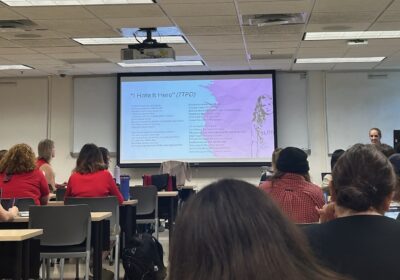USF faculty senate welcomes new president: ‘A really powerful set of voices’

David Simmons, the new president of the USF faculty senate, said if someone had asked him a year ago if he wanted such a demanding position, he would’ve said no.
“I love research,” he said. “I love teaching. I wasn’t gonna take time away from them unless I felt like I was doing something that really mattered.”
As faculty senate president, Simmons said he is the voice of the faculty at USF, advocating for professors and connecting them with administration.
Simmons said he accepted the role in early August because he felt it would give him a chance to make a difference at USF.
“It’s not a place to just push my own priorities,” he said. “It’s a place to advance USF’s priorities as seen by the faculty.”
USF’s faculty senate is responsible for reviewing and making recommendations on all matters concerning the university’s academic mission to USF administration, such as President Rhea Law and Provost Prasant Mohapatra.
With his new role, Simmons will also serve on the Board of Trustees, USF’s decision-making body. He will hold the position for two years.
Related: USF drops in U.S. News & World Report college rankings
Simmons is one of the only two Board members who are elected rather than appointed. The other is filled by the student body president.
He said this position is particularly important now because higher education is in a “rapidly evolving regulatory environment.”
He said there needs to be “a lot of ongoing engagement” so USF can adhere to new regulations while considering faculty and student needs.
At the Board’s most recent meeting in September, Simmons spoke on faculty’s concerns regarding recent policies.
Related: USF profs condemn order to review courses for antisemitism
He addressed an order from the state to review courses for antisemitic content and said it wasn’t “the way to fight antisemitism in Florida.”
“What we have here is a policy that’s intended to combat antisemitism, but potentially does the opposite,” Simmons said at the meeting.
He also talked about how the state’s foreign countries of concern guidelines – which mention China, Venezuela, North Korea, Syria, Russia, Cuba and Iran – will affect USF’s ability to recruit research students.
The policy requires universities to get approval before hiring “foreign principals” for academic, administrative or research purposes.
“That’s an area where we are going to have to find strategies, to find other pathways to recruit graduate student researchers in order to continue growing our research enterprise,” he said.
Related: USF to host conference on envisioning peace in the Middle East
Simmons said his job relies on teamwork and leadership – skills he learned as an engineering student and during his 25 years of research.
Originally from Miami, Simmons got his bachelor’s degree from the University of Florida before going out of state to do research. He came to USF in 2018 to work as an engineering professor.
“I started looking into USF and realized just how much it had exploded in a positive way as a leading university since I left Florida,” he said. “This is a place that’s changed a lot.”
Simmons wasn’t always set on the teaching side of engineering.
He started his career as an intern in biomedical engineering startups, but said he fell in love with helping students learn.
But it wasn’t an easy path – Simmons said he got a C in one of his thermodynamics courses.
“It’s really exciting to be the first person that exposes students to those ideas and help them avoid the pitfalls that made that subject tough for me, and make it engaging and interesting,” he said.
Simmons said his experience in engineering will help him as faculty senate president because of his problem solving skills.
He said it will be useful when going through numbers of different budget models or thinking through how to make decisions.
But the faculty senate benefits from having a variety of perspectives, from engineering to philosophy, according to Simmons.
“What’s beautiful about the senate is we have faculty from so many different backgrounds,” Simmons said. “When we do a good job of bringing together those different viewpoints, it’s a really powerful set of voices.”







